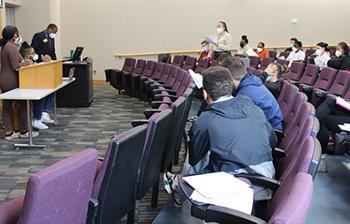Political Science students experience the legislative process

Alfred University students in the State and Local Politics class of Political Science Assistant Professor Desmond Wallace gathered on campus Saturday and Sunday to debate and vote on about 20 legislative proposals drafted earlier by individual class members.
Alfred University students in the State and Local Politics class of Political Science Assistant Professor Desmond Wallace gathered on campus Saturday and Sunday to debate and vote on about 20 legislative proposals drafted earlier by individual class members. The two-day session was designed by Wallace to simulate the formal legislative sessions of county, state and even federal legislatures.
Wallace has used simulated legislative sessions before in his State and Local Politics class, based on experiences he had as an undergraduate studying political science. “Basically, it’s a way to give students exposure to what state and municipal politics are like,” he says. “It’s an experiential assignment that introduces them to the legislative process.”
Students researched and drafted the bills themselves, and the legislation ranged from a proposal to amend New York’s Farm Laborers Fair Practice Act to a requirement that public high schools include a course that teaches students life skills, such as writing a resume or establishing a favorable credit rating.
The two days of simulated legislative activity also included detailed immersion in Roberts Rule of Orders, and an introduction to the business of introducing parliamentary motions, complete with the vocabulary of the process: Any student wanting to register a complaint was required to say: “I rise to a question of privilege.” Any student who had heard enough debate could either call for a deciding vote (“Move the previous question.”) or propose kicking the issue down the road (“I move to lay the question on the table.”).
Students served as legislators, defending or criticizing various proposals, with Michael Bradley serving as Majority Delegation leader; Tatiana Mejia as Minority Delegation leader and Jordan Chambers as Clerk of the Legislature. Wallace himself served as presiding officer, guiding the session through morning and afternoon sessions. He also served as governor – and vetoed 13 of the 18 bills that passed.
“I vetoed some for policy reasons,” he says. “Other reasons were political.”
Ten of his vetoes were over-ridden by two-thirds majority votes of his students.
Students also heard from Brooke Harris, vice-chair of the Allegany County Legislature, who described the complex interplay between the responsibilities of New York county governments and the state and federal governments.
Wallace says students were surprised not only by the formalities of the legislative process but also by the serious intellectual demands of researching, proposing, criticizing and defending legislation. Overall, the sessions generated positive feedback from both students and colleagues, and there were moments during the sessions when a student-legislature made a comment that broke the tension.
Which occasionally happens in real government too.
